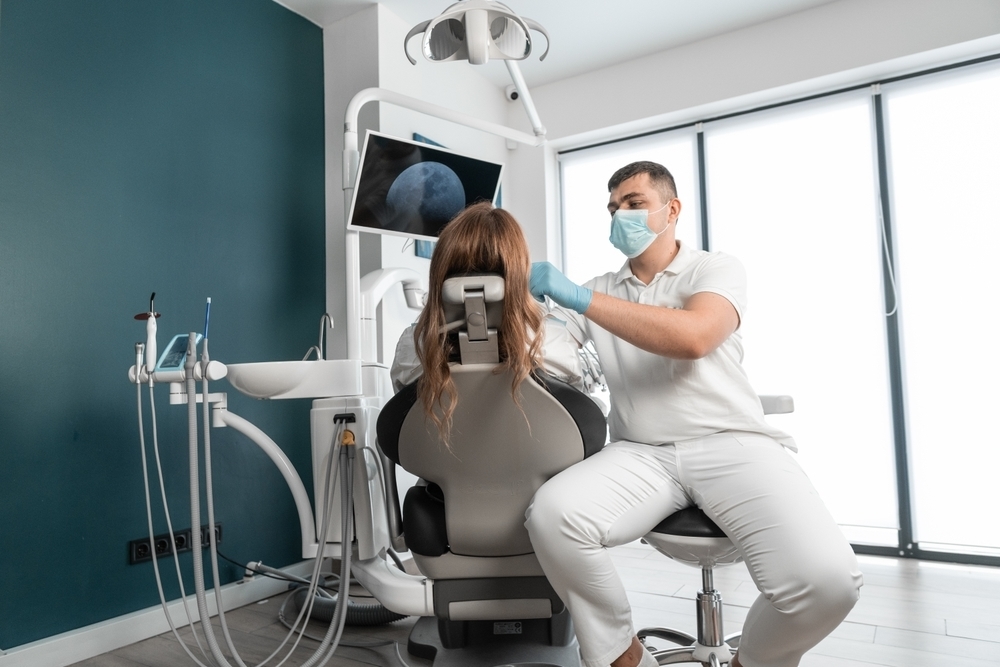
☝️ The most important facts in brief
- The starting salary for dentists is around €3,500 gross per month or €42,000 per year.
- Salaries rise steadily with increasing professional experience. After 9 years of professional experience, the average gross salary is €84,892 per year or €7,074 per month.
- Dentists with their own practice generate an average practice surplus of € 15,250 gross per month.
- Regional differences have an impact on salaries. Dentists earn the most in Baden-Württemberg with an average of €5,582 per month.
- There are considerable salary differences between the sexes. Women at the same qualification level often earn more than €20,000 less per year than their male colleagues.
📖 Table of contents
As a dentist in Germany, you can expect to earn an attractive salary. But what exactly is your income made up of and what factors influence the amount you earn as a dentist? In this article, you can find out everything you need to know about dentist salaries.
Are you interested in studying medicine?
We will be happy to advise you free of charge about your options for studying medicine, including advice on studying medicine in another EU country, which is fully recognised in Germany.
Average salary of a dentist in Germany
The average salary for dentists is around €80,321 gross per year, which corresponds to a monthly salary of around €6,478. However, the salary varies depending on professional experience, region and area of work.
Annual salary and monthly salary at a glance
The median gross salary of dentists in Germany is € 80,321 per year or € 6,478 per month for a 40-hour week. 50% of dentists earn more than this figure, while the other half earn less. The lower quartile is €67,554 per year or €5,448 per month, while the upper quartile is €95,502 per year or €7,702 per month. These values refer to the general salary distribution in dentistry, regardless of factors such as professional experience or personnel responsibility.
Starting salary for young professionals
As a career starter in dentistry, you will initially spend two years as a dental assistant. During this phase, your salary as a dentist will be somewhat lower. The starting salary is usually between 2,500 and 3,500 euros gross per month. However, your earnings will increase quickly as you gain experience. Even in the first year after their residency, salaried dentists can expect a gross salary of at least €4,500 per month.
Position | Gross per month | Gross per year |
Dentist Median | 6.478 € | 80.321 € |
Lower quartile | 5.448 € | 67.554 € |
Upper quartile | 7.702 € | 95.502 € |
Starting salary assistantship | 2.500 - 3.500 € | 30.000 - 42.000 € |
After residency | from € 4,500 | from € 54,000 |
Assistance time and salary development
During the two-year residency after graduation, you will deepen and expand your practical skills. At the same time, you will gradually build up your own patient base. The salary usually increases every six months during this phase, so that by the end of your residency you can earn around €4,000 to €4,500 gross per month.
Phase | Average gross salary per month |
Career starter | 2.500 - 3.500 € |
End of the residency period | 4.000 - 4.500 € |
After 3 years of professional experience | approx. 5,600 € |
As a salaried dentist, you can choose between a fixed salary and a flexible salary with revenue sharing, depending on the agreement. The latter offers you the opportunity to participate disproportionately in the success of the practice through your own performance. Your negotiating skills are required here to negotiate attractive conditions and optimise your earning potential.
Salary during training as a dentist
As a rule, prospective dentists do not receive a training allowance while studying dentistry. Students have to cover their own living expenses and the costs of their studies, which requires careful financial planning in advance. Depending on the federal state, tuition fees may also be incurred, which can place an additional burden on the budget.
Access to the dental degree programme is restricted by the Numerus Clausus (NC), which was between 1.1 and 1.3 in the winter semester 2021/2022. 20% of study places are allocated on the basis of A-level grades, with a further 20% allocated according to waiting times, which often amount to more than 10 semesters. These hurdles make it clear that, in addition to financial preparation, a good academic performance or patience are also required to apply for a study place. We help you overcome these hurdles with a Studying medicine abroad so that you can quickly and safely Study medicine can.
During their studies, prospective dentists have various options available to them to improve their financial situation. These include, for example, applying for BAföG, taking out a student loan or looking for scholarships. It is important to examine these options at an early stage and find the best individual solution.
Despite the financial challenges during their studies, the prospect of a varied and responsible career with good earning potential after graduation is an attractive prospect for many students. With the right planning and preparation, the path to becoming a dentist can be successfully mastered.

Earning potential at the start of your career
As a career starter in dentistry, you can expect an attractive starting salary. The exact amount varies depending on the region and practice size, but is on average between €2,500 and €3,500 gross per month. Although you won't start at the salary level of experienced colleagues, you will have a solid foundation at the beginning of your career.
Your starting salary as a dentist depends on various factors. Larger practices in urban centres often pay more than smaller practices in rural areas. Your specialisation and any additional qualifications can also have a positive effect on your starting salary.
Dentist salary: How it develops
With increasing professional experience as a dentist, new salary prospects and opportunities to increase your salary open up. In addition to an attractive fixed salary, you can also benefit from flexible salary models with revenue sharing. Setting up your own practice also offers lucrative earning opportunities. In the public healthcare sector, payment is based on fixed collective agreements.
Fixed salary vs. flexible salary with revenue share
As an employed dentist after your residency, you should aim for a fixed salary of at least 4,000 euros as an employee. This offers security and predictability, but is less flexible in terms of salary increases. An alternative is a salary model with revenue sharing. Here, you receive a percentage of the turnover generated by the dental practice in addition to your basic salary from a certain fee level. In this case, revenue shares of between 20 and 30 per cent are common.
Earning opportunities for dentists with their own practice
Setting up your own dental practice gives you the opportunity to earn an above-average income. As a practice owner, you will generate an average practice surplus of around €15,250 gross per month. Your exact earning potential depends on various factors, such as the location of your practice, your specialisation in dental health and the size of your patient base.
Payment in the public healthcare sector according to collective agreement
In the public sector, dentists are paid according to the collective agreements of the federal government (TVöD) or the federal states (TV-L). As a training assistant, you start with a monthly salary of around 3,600 euros in the first year, rising to 4,300 euros in the third year. Specialist dentists start out earning around 4,400 euros per month, rising to 6,500 euros after six years.
Professional group | Monthly salary (gross) |
Employed dentist after residency | from € 4,000 |
Practice owner | Ø 15.250 € |
Training assistant (1st year) | approx. 3,600 € |
Training assistant (3rd year) | approx. 4,300 € |
Specialist dentist (1st year) | approx. 4,400 € |
Specialist dentist (after 6 years) | up to € 6,500 |
Regional differences in dentist salaries
The salary of dentists in Germany varies depending on the region and federal state. Various factors such as the number of patients, the location of the practice and the general cost of living play an important role. Over the course of their career, dentists can earn a higher income in certain federal states than in other regions of Germany.
Salaries by federal state
The salaries of dentists differ from state to state. In Baden-Württemberg, the average annual salary is 77,969 euros, followed by Hesse with 77,438 euros and Bavaria with 76,087 euros. In North Rhine-Westphalia, dentists earn an average of 74,730 euros per year, while the salary in Berlin is 71,798 euros. There are lower earning opportunities in the eastern federal states such as Brandenburg with 65,468 euros and Mecklenburg-Western Pomerania with 64,020 euros.
Federal state | Average salary per year |
Baden-Württemberg | 77.969 € |
Hesse | 77.438 € |
Bavaria | 76.087 € |
Hamburg | 76.727 € |
North Rhine-Westphalia | 74.730 € |
Berlin | 71.798 € |
Brandenburg | 65.468 € |
Mecklenburg-Western Pomerania | 64.020 € |
Cities with the highest earning potential
In addition to the regional differences, there are also cities within the federal states where dentists earn particularly well. In Stuttgart, the average annual salary is around 69,800 euros, followed by Munich, Bonn and Cologne with over 68,000 euros each. Dentists can also earn attractive salaries in other major cities such as Hamburg, Frankfurt am Main and Düsseldorf. However, it should be noted that the cost of living is often higher in these cities, which should be taken into account when choosing a place of work.
Factors that influence the dentist's salary
Your salary as a dentist depends on many different factors. There are no collective agreements that determine your income for dentists. Instead, your individual negotiating skills or your employer have a significant influence on how much you earn at the end of the month. It is therefore hardly surprising that the salary range for dentists in Germany varies between 46,000 and 130,000 euros gross per year.
The most important factors that determine your dentist salary include your professional experience, the location of your dental practice, the federal state in which you practise and your gender. Whether you are permanently employed or self-employed and whether you specialise in certain dental disciplines will also affect your salary. As a career starter, your starting salary is usually between 45,000 and 70,000 euros gross per year, while experienced dentists often earn more than 80,000 euros.
Regional differences also play a role in your earnings as a dentist. In southern Germany, especially in Baden-Württemberg, Bavaria and Hesse, you can tend to earn more than in the new federal states such as Saxony-Anhalt, Thuringia or Mecklenburg-Western Pomerania. Munich tops the list of cities with the highest salaries for dentists, followed by Stuttgart and Nuremberg. In Leipzig, on the other hand, you are more likely to find salaries at the lower end of the spectrum.
In addition to the location of your dental practice, the size and equipment of your practice also influence your income. If you work in a modern, well-equipped practice in a sought-after location with a wealthy clientele, you can earn a higher salary. Your training and further education will also have a positive effect on your salary. With increasing professional experience and continuous further training, attractive earning opportunities are open to you as a dentist, especially if you have entrepreneurial skills and business expertise.
Free information material
Studying medicine abroad 🎉
Order your information pack now, find out more about studying medicine abroad and get started as a medical student!





